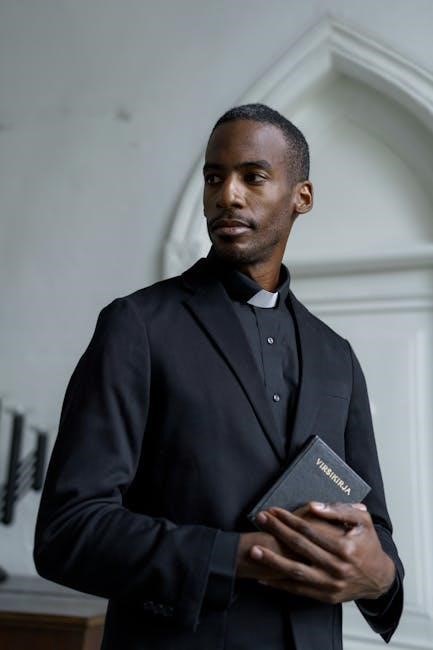Biblical responsibilities of a man are rooted in God’s design, emphasizing leadership, provision, and spiritual growth. Understanding these duties is essential for living a virtuous, God-honoring life.
1.1. Overview of the Role of Men in Biblical Teachings
In biblical teachings, men are called to fulfill roles that reflect God’s design, emphasizing leadership, provision, and spiritual guidance. From creation, men are entrusted with responsibilities to steward God’s resources and lead with integrity. Biblical examples, such as Adam and David, illustrate the importance of accountability and faithfulness in fulfilling these divine mandates.
1.2. Importance of Understanding Biblical Responsibilities
Understanding biblical responsibilities is crucial for men to align their lives with God’s purpose. It fosters accountability, integrity, and servant-leadership, enabling them to honor God in their roles as husbands, fathers, and community members. Neglecting these duties can lead to irresponsibility, harming families and societies. Embracing biblical responsibilities ensures a life of purpose, integrity, and eternal impact.

Leadership and Servant-Hood
Biblical leadership is rooted in servant-hood, guiding with humility and integrity. Men are called to lead by serving others, reflecting Christ’s example of love and sacrifice.
2.1. The Concept of Servant Leadership in the Bible
Servant leadership, modeled by Jesus, emphasizes serving others selflessly. Biblical leaders prioritize humility, compassion, and accountability, reflecting God’s heart. This concept challenges men to embrace responsibilities with grace and integrity, fostering a culture of love and mutual respect within families, communities, and the church.
2.2. Biblical Examples of Leadership (e.g., Adam, David, Jesus)
Adam, as the first man, was tasked with stewardship and responsibility in Eden. David exemplified leadership through reliance on God, despite flaws. Jesus, the ultimate leader, demonstrated servant leadership through sacrifice and humility. These biblical figures provide timeless examples of leadership, guiding men to embrace responsibility, integrity, and faithfulness in their roles.

Provision and Protection
Provision and protection are central to a man’s biblical responsibilities, ensuring his family’s well-being and safety both physically and spiritually, reflecting God’s care and provision.
3.1. The Responsibility to Provide for Family
Providing for the family is a cornerstone of biblical manhood, emphasizing financial, emotional, and spiritual support. Men are called to work diligently, ensuring their household’s needs are met, as seen in 1 Timothy 5:8. This responsibility reflects God’s provision for His people, making it an act of worship and obedience to His will, ensuring family well-being and stability.
3.2. Protecting Loved Ones Spiritually and Physically
Protecting family spiritually and physically is a divine mandate for men. They must safeguard their loved ones from harm, ensuring their spiritual well-being through prayer and guidance. Physically, men are to create a safe environment, mirroring God’s protective nature. This dual responsibility fosters a secure and nurturing home, reflecting Christ-like leadership and care, as inspired by Psalm 91:4 and 1 Corinthians 16:13.

Spiritual Growth and Accountability
Spiritual growth involves studying and obeying Scripture, while accountability means being answerable to God and others. This dual focus helps men live faithfully and set a godly example.
4.1. The Duty to Study and Obey Scripture
A man’s primary spiritual duty is to study and obey Scripture, seeking God’s truth. This involves dedicating time to understand biblical teachings, applying them to daily life, and aligning actions with God’s will. Through faithful obedience, men grow in wisdom, deepen their faith, and become examples of godly living, fulfilling their accountability before God and others.
4.2. Accountability Before God and Men
Men are called to accountability before both God and others. This duty begins with Adam, emphasizing responsibility for actions and their consequences. As leaders, men must be answerable for their decisions and conduct, reflecting integrity and humility. Accountability ensures spiritual growth and maintains trust in relationships, fulfilling God’s mandate for righteous living and leadership, both within the family and the broader community.

Roles in the Family
A man’s role in the family is foundational, involving leadership, provision, and protection. He is called to be a loving husband and a guiding father, setting a godly example for his household, ensuring their spiritual and physical well-being through faithful stewardship and selfless love.
5.1. The Role of a Husband in a Christian Marriage
A husband in a Christian marriage is called to embody servant leadership, loving his wife sacrificially, as Christ loves the Church. He is to provide spiritual guidance, ensuring his wife’s well-being, and foster a relationship rooted in mutual respect and submission. This role reflects Christ’s love, creating a harmonious and godly home, where both partners grow in faith and fulfill their divine purpose together.
5.2. Responsibilities as a Father and Provider
A father is tasked with teaching his children about God, leading by example in faith and integrity. He must provide for his family’s physical needs, ensuring their well-being while protecting them spiritually. Biblical fatherhood emphasizes guidance, discipline, and nurturing, fostering a godly home where children grow in wisdom and fear of the Lord, reflecting God’s love and provision in all aspects of family life.

Worship and Prayer Life

Worship and prayer are fundamental to a man’s spiritual life, fostering a deeper connection with God and guiding him in fulfilling his divine responsibilities faithfully.
6.1. The Importance of Worship in a Man’s Life
Worship is central to a man’s life, fostering humility, gratitude, and alignment with God’s will. It strengthens his relationship with the Almighty, guiding him in fulfilling divine responsibilities.
6.2. Leading Family in Prayer and Spiritual Practices
Leading family in prayer and spiritual practices is a vital biblical responsibility. Men are called to set a godly example, fostering unity and spiritual growth. Through prayer, Scripture reading, and worship, they guide their families in nurturing a deep relationship with God, creating a home environment centered on faith and obedience to His will.

Stewardship and Work Ethic
Men are called to manage God’s resources wisely, demonstrating faithfulness and diligence. Biblical stewardship involves responsibly handling time, talents, and possessions to glorify God in all endeavors.
7.1. Managing God’s Resources Wisely
Men are entrusted as stewards of God’s resources, including time, talents, and possessions. Wise management involves using these gifts prayerfully and responsibly to serve others and honor God. This includes prioritizing generosity, avoiding wastefulness, and ensuring alignment with biblical principles. Effective stewardship reflects faithfulness and trust in God’s sovereignty over all areas of life, fostering a culture of gratitude and integrity.
7.2. The Biblical View of Work and Diligence
Work is a divine mandate, as God created man to labor and manage His creation (Genesis 2:15). Diligence reflects faithfulness, commitment, and stewardship, glorifying God through fruitful endeavors. Proverbs emphasizes the value of hard work and the consequences of laziness, urging men to embrace responsibility and perseverance. Biblical work ethic aligns with worship, serving as a means to honor God and provide for others.

Community and Church Involvement
Men are called to serve actively in both church and community, fostering strong relationships and being a moral example, reflecting God’s love and integrity in all interactions.
8.1. Serving in the Church and Community
Men are called to serve actively in the church and community, demonstrating God’s love through volunteer work, mentoring, and outreach. Biblical responsibilities include leadership roles, such as teaching, guiding, and supporting others. By engaging in community service and church ministries, men reflect God’s integrity and compassion, fostering a positive impact on both spiritual and societal well-being.
8.2. Building Strong Relationships with Brethren
Building strong relationships with fellow believers is a key biblical responsibility for men. This involves fostering unity, offering support, and encouraging spiritual growth. Men are encouraged to engage in meaningful fellowship, resolve conflicts biblically, and maintain accountability. By prioritizing these relationships, men strengthen the church and reflect Christ’s love, creating a harmonious and supportive community of faith.

Ethical Living and Moral Integrity
Biblical responsibilities include living with integrity, honesty, and moral uprightness. Men are called to uphold ethical standards, reflecting God’s character in all aspects of life.
9.1. Living a Life of Integrity and Honesty
Living with integrity and honesty is a cornerstone of biblical manhood. Men are called to uphold moral standards, reflecting God’s character in their actions and decisions. This involves being truthful, transparent, and consistent in all relationships. Integrity fosters trust and respect, while dishonesty leads to broken relationships and spiritual decay. A man of integrity aligns his words and deeds with God’s truth, serving as a moral compass for others.
9;2. Being a Moral Example in Society
Men are called to be moral examples, reflecting God’s character in society. This involves living with humility, justice, and compassion, influencing both believers and non-believers. A man’s moral example shines through his actions, demonstrating integrity and love. By aligning his conduct with biblical teachings, he becomes a light in the world, showcasing Christ’s values and inspiring others to follow a virtuous path.
Fulfilling biblical responsibilities as a man leads to a life of purpose and eternal impact. By embracing leadership, provision, and spiritual growth, men honor God and inspire others.
10.1. Practical Steps to Fulfill Biblical Responsibilities
- Prioritize studying Scripture to guide decisions and actions.
- Engage in regular prayer, seeking God’s wisdom and strength.
- Lead family worship and set a spiritual example.
- Embrace ethical living and moral integrity in all areas.
- Accept accountability for actions and their consequences.
- Steward resources wisely, recognizing God’s ownership.
- Actively serve in the church and community.
10.2. The Eternal Impact of Faithful Manhood
Faithful manhood leaves a lasting legacy by honoring God in leadership, provision, and integrity. It shapes future generations and inspires others to follow Christ, ensuring a divine influence that transcends time and transforms lives eternally.